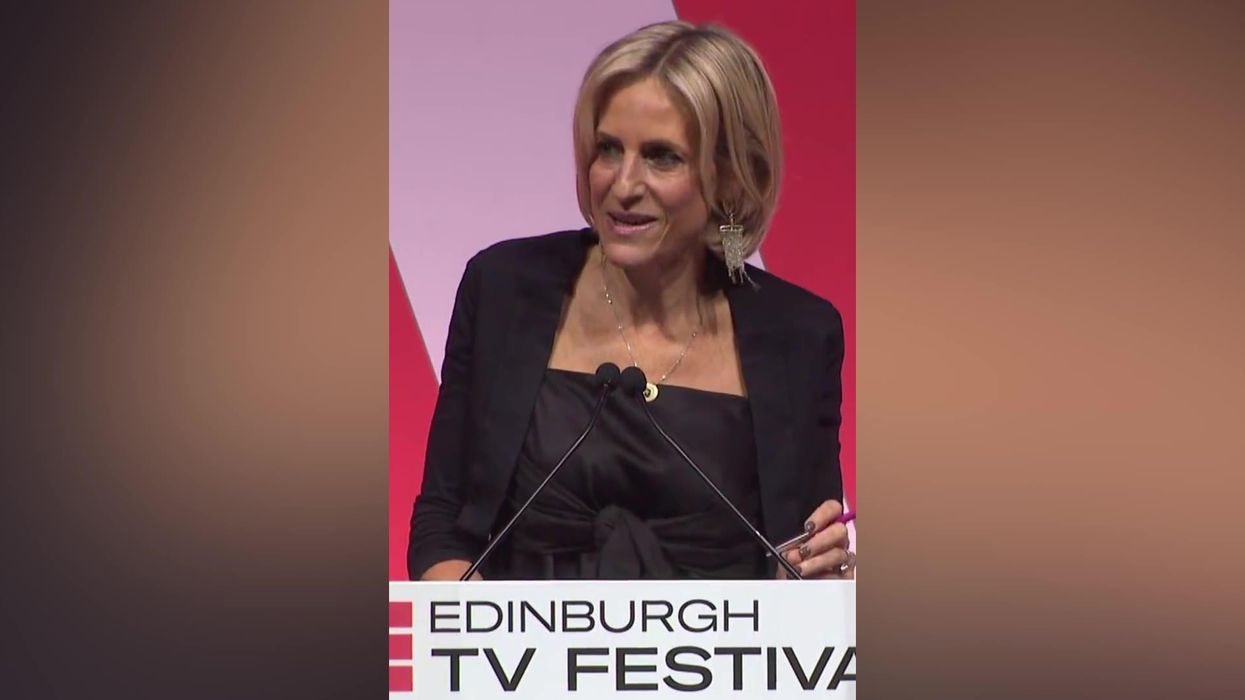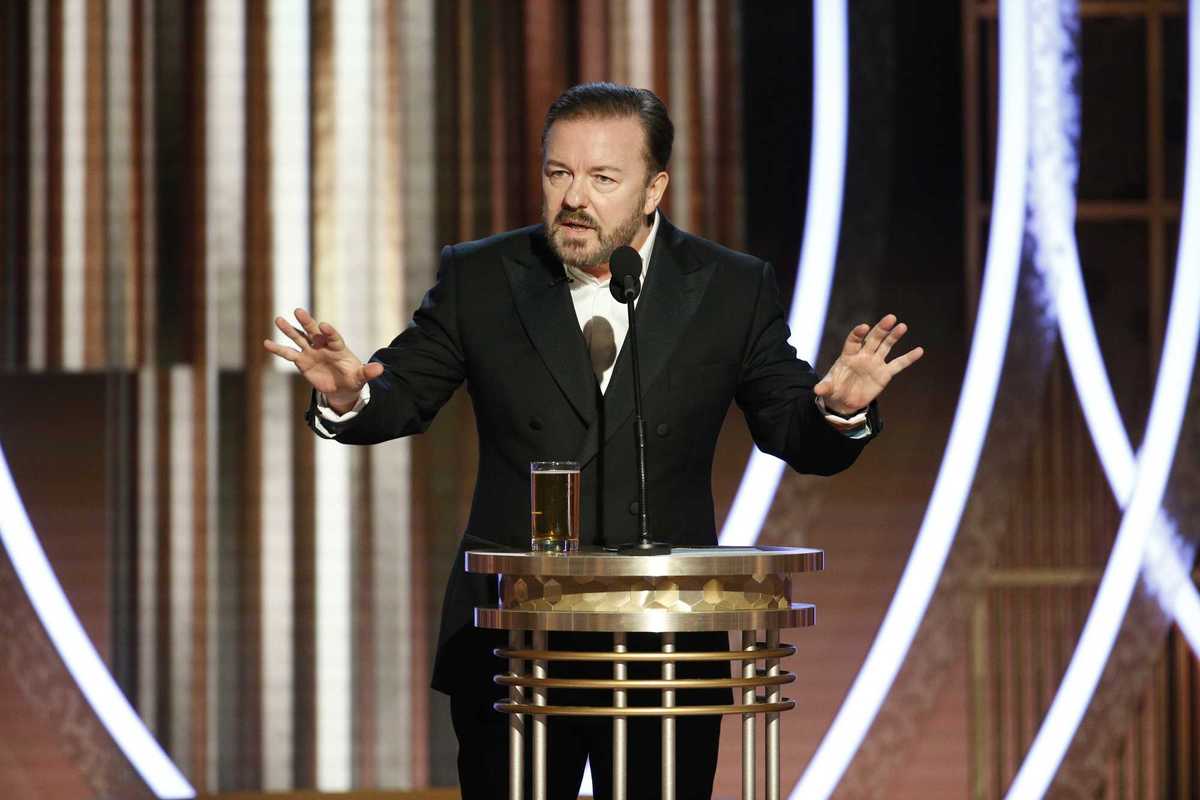Liam O'Dell
Aug 25, 2022
Tory party 'agent' shaping BBC coverage, says Emily Maitlis
Sky News
Former BBC Newsnight presenter and the journalist behind the infamous Prince Andrew interview, Emily Maitlis, has been widely praised for her MacTaggart Lecture at the Edinburgh TV Festival on Monday.
Titled “Boiling Frog: Why We Have to Stop Normalising the Absurd’, the soon-to-be co-host of Global’s The News Agents podcast warned of the rise of populism, as well as the part reporters and broadcasters have played in that.
“My suspicion – or no, OK, be braver – my thesis, is that the political actors have changed, politics has changed, but we as journalists have not yet caught up,” said Ms Maitlis.
Sign up to our free Indy100 weekly newsletter
Clips from the speech – around 40 minutes in total – have already circulated on social media, and while we’d encourage you to watch the speech in full, here are the highlights for your reading pleasure.
“Deleterious” politicians
Describing the current political landscape, Ms Maitlis said: “We are seeing politicians move in directions that are deeply and clearly deleterious to basic democratic government, so what has changed?
“There’s always been scope for abuse in our constitution, of course, but in recent times, so many previously settled questions around our democratic norms have been upended, and at sudden speed.”
The journalist had plenty of examples to choose from, including the ministerial code being “violated with impunity”, the unlawful proroguing of parliament, “limits placed on judicial review” and government ministers “failing to defend the role of the judiciary”.
“You know all of this. You can join in the chorus,” she said.
Her take on Liz Truss’ recent swipe at the BBC
In case you missed it, during a Tory leadership hustings in Manchester last week, the Conservative leadership candidate Liz Truss took aim at the public service broadcaster after GB News host and interviewer Alastair Stewart slipped up on a fact during their conversation.
Responding to Mr Stewart’s question about “a piece [she] contributed to back in 2019”, Ms Truss replied: “I think that was 2009, Alastair… I always thought you had high-quality standards at GB News.
“It’s not the BBC; you actually get your facts right.”
Touching upon this in her lecture, Maitlis said: “The larger the gap, in other words, that populists can create between recognisable media sources and the people, the less impeded they will be impeded by any scrutiny – any attempt to hold them accountable for the decisions they make in power.”
She went on to challenge anyone who thought such an idea was “old news” by referencing Ms Truss’ comments, adding: “It was an artful bit of flattery which she used to evade a challenging question.”
Her bit on that Corbyn graphic on Newsnight
Back in March 2018, not long after former Russian spy Sergei Skripal and his daughter Yulia were poisoned with the “military grade” nerve agent Novichok, Newsnight displayed an image of then-Labour leader Jeremy Corbyn against the Kremlin.
Critics accused the image of being edited to make the politician appear “more Russian”, with Guardian columnist Owen Jones saying at the time that Mr Corbyn had been made to look like a “Soviet stooge”.
He said at the time: “Yesterday, [in] the background of your programme, you had Jeremy Corbyn dressed up against the Kremlin skyline, dressed up as a Soviet stooge. You even photoshopped his hat to look more Russian.”
Acting editor of Newsnight Jess Brammar took to Twitter to address the claims, writing the BBC news programme “didn’t photoshop a hat”.
Ms Brammar said: “Our (excellent, hardworking) graphics team explained the image has had the contrast increased and been colour treated, usual treatment for screen graphics as they need more contrast to work through the screens.
“If you look you can see it’s the same hat in silhouette.
“Apparently (forgive me for passing on tech details I don’t understand first-hand) some detail might also have been lost with it going through the screen and then being filmed back through a camera, again the standard effect on images on that big back panel.
“And finally, the Russia background was a rehash of one Newsnight used a few weeks ago, for a story about Gavin Williamson, the defence secretary.”
Harking back to that time, and referencing a paper on “strategic bias” by scholar Ayala Panievsky, Ms Maitlis said: “By the end of that week, we had invited on a Corbyn supporter [and] commentator to explain to us what we had done wrong!
“[Panievsky] explains that a broadcaster’s desire to be seen as neutral agents paradoxically enables populists to further spread the claim that we are not.
“We were offering a platform to the very people trying to tell the public to distrust our news.”
The Prince Andrew interview
Away from the more serious points made by the journalist in her lecture, Ms Maitlis also had time to sprinkle in a few cheeky jokes and light-hearted quips.
She mocked former Northern Ireland secretary Brandon Lewis’ previous comments on a bill breaking the law in a “specific and limited way”, impersonated actor Robert De Niro, and addressed that interview with the Duke of York.
“A lot of the examples that I’ve used here have been from my own experience. They aren’t meant to be my greatest hits, nor my walk of shame, it’s just the stuff that I found easiest to revisit with questions of how we should be doing our job better.
“I apologise to anyone who came thinking this would be about the Prince Andrew interview - that will have to wait till next time, promise,” she joked.
We’d make a comment about Prince Andrew being made to feel like a boiling frog during that interview with Ms Maitlis, but that would be silly – he’s apparently incapable of sweating, after all.
An “active agent” of the Conservative Party within the BBC
Turning to another moment from her time at the BBC, she touched upon the broadcaster issuing a statement after Downing Street complained about a Newsnight introduction – one which criticised Dominic Cummings’ Durham visit during lockdown.
She asked: “Why had the BBC immediately and publicly sought to confirm the government spokesperson’s opinion, without any kind of due process? It makes no sense for an organisation that is admirably, famously rigorous about procedure, unless it was perhaps sending a message of reassurance directly to the government itself.
“Put this in the context of the BBC board, where another active agent of the Conservative Party - a former Downing Street spin doctor, and former adviser to BBC rival GB News – now sits, acting as the arbiter of BBC impartiality.”
Ouch.
And if you’re wondering exactly who Ms Maitlis was referring to with these comments, it’s understood that they are about Sir Robbie Gibb, a former Downing Street communications director from 2017 to 2019 who was appointed to the board by Boris Johnson’s government last year.
Taking aim at politicians and broadcasters’ Brexit reluctance
Free from the bounds of BBC impartiality, Ms Maitlis also chose to criticise a “wall of silence” around Brexit, such as when there was “havoc at Dover customs”.
“Those who promised to ‘get Brexit done’ can’t mention it, because it clearly isn’t. Their insistence on third nation status has meant passport checks and horrendous waiting times.
“Labour avoids talking about Brexit because it’s decided, rightly or wrongly, to distance itself from ‘remainer’ tags, and large sections of both the BBC and government-supporting newspapers, appear to go into an automatic crouch position whenever the Brexit issue looms near,” she claimed.
Ms Mailtis went on to add: Many broadcasters fear discussing the obvious economic cause of major change in this country in case they get labelled pessimistic, anti-populist or worse still – see above – unpatriotic.
“Yet every day that we sidestep this issue with glaring omissions, feels like a conspiracy against the British people. We are pushing the public further away.”
Her solutions for getting us out of this mess
All of the above sounds rather bleak, doesn’t it? Fortunately, Ms Maitlis offered five ideas for tackling populism and the part the media plays in amplifying that:
- Sunlight: “We need to show our workings more. We need to be braver about explaining the pressures under which we come and our own responses to them.”
- A glossary: “We, the ‘frogs’, have to give names to the populist playbook tricks that we encounter.”
- A change in reporting style: “I hope that instead of the cliched stagecraft of Supporter X vs Supporter Y, we might choose nuance.”
- Tweets: “Tweets need the same level of scrutiny in terms of whether they should even be considered for publication.”
- “Fair and robust” mediation between “those in power” and the public: “The challenge for us, I think, is how we live up to that responsibility in a way that is both fair and robust, because either without the other is useless … We don’t have to be campaigners, but nor should we be complacent, complicit onlookers. Our job is to make sense of what you’re seeing, and anticipate the next move."
Even condensing the speech down to a listicle feels like we’re doing the veteran broadcaster a disservice, but to summarise even further: Emily Maitlis for PM?
Have your say in our news democracy. Click the upvote icon at the top of the page to help raise this article through the indy100 rankings.
Top 100
The Conversation (0)














